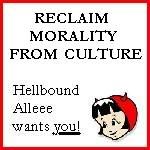Here is the main question that preoccupies me in this entry : which, of anarchy or government, is the natural state of man ?
This may seem like a weird question. After all, everything is "natural", at least in the sense of being a product of physical processes. Rather, I want to contrast the "natural" in this case with the "man-made". For example, I think it's pretty obvious that, whatever you think about the research on spirituality in the brain, specific religions like Christianity are man-made.
So when I use the word "natural", I am talking more about the "state of nature" abstraction that is common to political theory. Some philosophers thought that the state of nature is brutish and violent, and that government is needed to enforce cooperation on human beings. Others thought that human beings, by and large, are able to cooperate, organize themselves, and get rid of criminal elements without a monopoly of force.
One's opinion on the state of nature is not idle speculation, but rather informs one's political beliefs. If man cannot live peacefully without government, then government is justified. If man can live peacefully without government, then government is unjustified. How you see other people has a direct bearing on how you think we should live. The Marxists say man as a greedy exploiter, and thus gave rise to the bloodiest dictatorships in history. The Founding Fathers of American, inspired by the Enlightenment which glorified man's capacities and power, saw man as having inherent dignity and rights.
Even this is not, I think, the right way of seeing the dilemma. If man is a brute, then government only compounds the problem. "Do Pessimistic Assumptions about Human Behavior Justify Government?", by Benjamin Powell and Christopher Coyne, makes that point forcefully :
The existence of a central state shifts and magnifies the power structure that is present in the initial state of nature. Rather than power being dispersed among the populace, it is centralized in the hands of a few. Once individuals possess this power, it is far from clear that they will promote the interests of the ruled. In some cases they may, but in others they may not. And, in the cases where they do not, they have the power to impose great harm on others. Given this uncertainty, one is unable to conclude, contrary to Buchanan and to Olson and McGuire, that a central state is better than an institutionless state of nature.
Or in short : if people in general are brutes and idiots, then fabricating a focus of power and giving it to the most ambitious brutes and idiots only creates a ruling class able to use all the resources of the monopoly to generate more brutality and idiocy.
So the issue of the natural state of man is perhaps not as important as most people think. Nevertheless, it remains an interesting question. I like to subdivide it in these three questions :
1. Is hierarchical organization the natural state of man ?
2. Is capitalism the natural state of man ?
3. Is government the natural state of man ?
My answers are YES, YES and NO.
1. Hierarchies necessarily arise in any enterprise or group, even a household. Heck, it's hard to get two people to live together for a while without them forming a hierarchy. It's also clear - as we observe from other primates - that hierarchies are an evolutionary adaptation designed to improve the survival potential of any single individual by delegating duties and rewards to the most powerful members of his group. So I think it's very clear that hierarchical organization is part of the state of nature.
2. People naturally desire to cooperate and trade. This seems to be another constant in human history. Most people desire to improve their condition and do not desire to do so by violence. Only the incentive-twisting of religion and government pushes them to use violence. So I think capitalism is part of the state of nature.
3. The question then becomes, are these two factors harmonious, or discordant, with the rise of government ? Taking the more reasonable Private Interest Theory narrative of the rise of government - that a group of strong people take control by force and promises to use said force against outside threats in exchange for loyalty - it seems that government is not harmonious with the natural desire for voluntary exchange.
Could the idea of government as social organization also be a fabrication, a sort of memetic freak that took over societies ? When I say freak, I mean something that evolved to such an extent that it has become supremely adaptable and can take over all the environments it gets a foot in. Homo sapiens is a great example of this. Religion is another. I think government is yet another.
In that perspective, the rise of government makes more sense. While rulers can be assassinated or overthrown, the idea of government is able to remain relatively unopposed because it has the power to manipulate people's worldviews and make government morally acceptable. In the same way that religion can make genocide look moral when done by a deity, enough indoctrination can make government wars look moral, and it takes a lot of effort to shift one's worldview back to a more sane and honest perspective.















